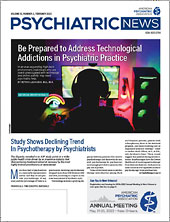It has been a longstanding tradition for the editors of the American Journal of Psychiatry to close out each year with a selection of articles from the previous year that rose above the rest.
“One of the most important and relevant articles that we published [in 2021] in the Journal is a call to action for psychiatry to confront and change the structural racism framework that significantly contributes to mental health care inequities,” wrote AJP Editor-in-Chief Ned Kalin, M.D., in the editorial “2021 Articles of Import and Impact” in the January issue.
The article Kalin was referring to was titled “Dismantling Structural Racism in Psychiatry: A Path to Mental Health Equity” by Ruth S. Shim, M.D., M.P.H. Shim is the Luke & Grace Kim Professor in Cultural Psychiatry at the University of California, Davis.
Shim opened the review with an examination of the meaning of the terms race, structural racism, social injustice, health disparities, and health inequities.
“While health disparities are differences in health status among distinct segments of the population, health inequities are defined as disparities in health that are a result of systemic, avoidable, and unjust policies and practices that create barriers to opportunity,” she wrote. “By describing the cause or origin of these differences in health, the definition of inequities is more precise. Because the term disparities does not identify the cause of the difference, there is a tendency to default to traditional and historical explanations for difference, which include seating the pathology with an individual or a population.”
Also captured in Shim’s article are the ways that policies that led to residential segregation beginning in the 1930s, and the War on Drugs in the 1980s have impacted and continue to impact the mental health of people of color.
“[A]s a result of residential segregation, psychiatrists and therapists were (and are) less likely to be located in low-income neighborhoods with greater percentages of Black and Latinx residents (when compared with high-income neighborhoods with less than 1% of Black or Latinx residents),” Shim wrote. “The structurally racist policies of the War on Drugs have led to the mass incarceration of people of color for substance use disorders.”
Shim concluded her piece with suggestions for how psychiatry can begin to dismantle the legacy of structural racism and advance mental health equity for all. There are immediate actions that mental health professionals can take, she noted, such as observing and challenging their own biases, enforcing social norms of inclusion and equity in personal and professional settings, and advocating for policies that may appear to not be directly related to mental health but are critical for it to succeed: stable housing, unemployment benefits, and access to healthy food.
“Because psychiatrists and other mental health professionals desire to promote the mental health and well-being of all people, we all have a moral responsibility to speak out against racial injustice wherever we encounter it, recognizing, in the words of Frederick Douglass, that ‘power concedes nothing without a demand,’ ” Shim concluded.
Also recognized in the editor’s picks for 2021 were studies that highlighted potential new treatments for depression and compulsive behaviors, called attention to medication-related cognitive impairments in schizophrenia, and provided insight into brain development in girls who were abused (see box). But the promise offered by such research cannot be truly fulfilled unless everyone can benefit equally, Kalin noted.
“As we avowed earlier in the Journal, the deputy editors and I have made the commitment to use the American Journal of Psychiatry as a means to combat structural racism and health care inequities,” Kalin wrote in his summary of Shim’s article. “We are specifically focused on improving mental health care for individuals of color and more broadly for individuals from underprivileged and discriminated communities. We thank Dr. Shim for moving us forward in this direction, as we enthusiastically continue in our pursuit of this critical goal.” ■
“Dismantling Structural Racism in Psychiatry: A Path to Mental Health Equity” is posted
here.

